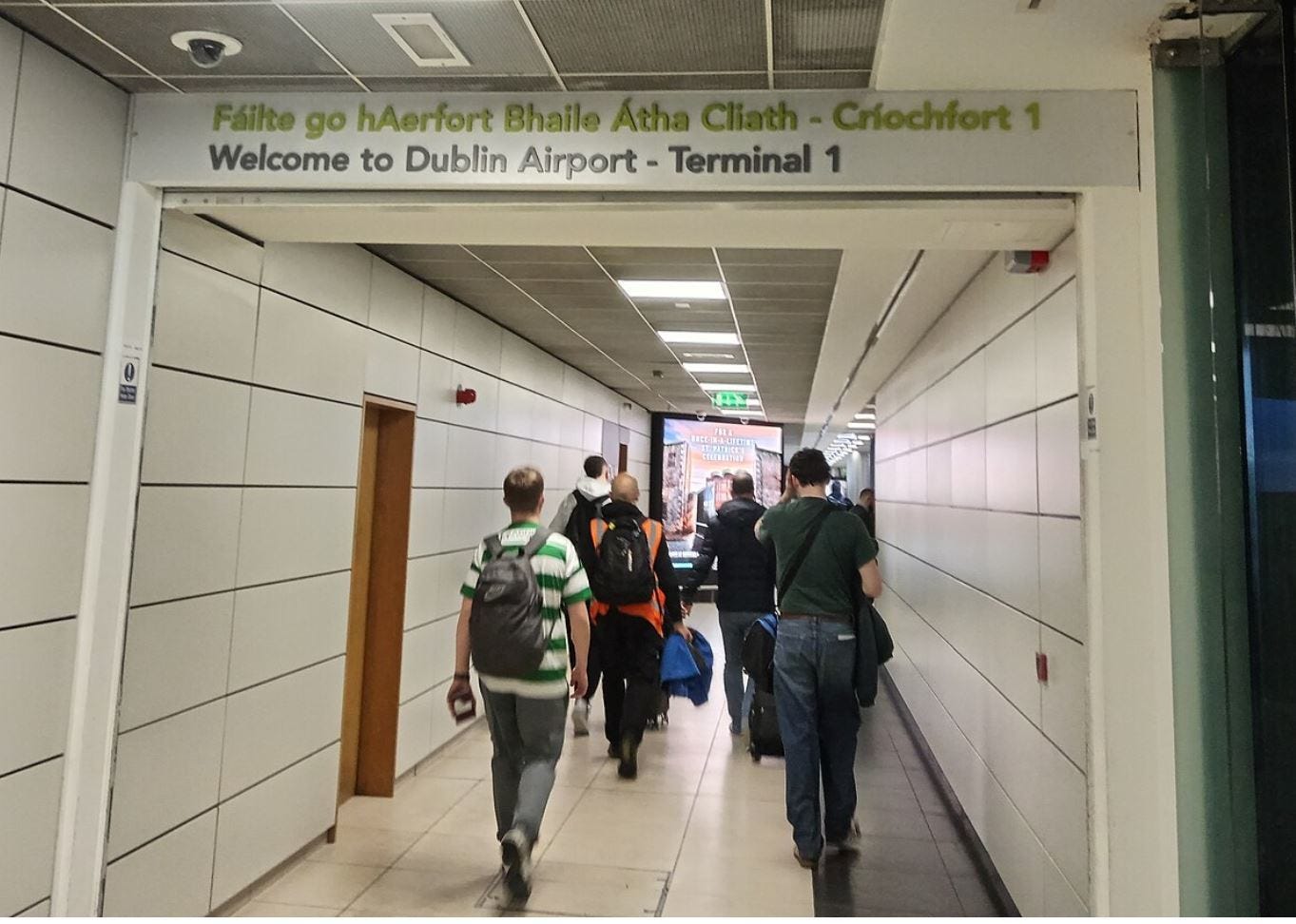'Kafkaesque' HMRC crackdown wrongly targets Northern Irish families using Dublin Airport
The extraordinary blunder by UK tax authorities shows no understanding of life on the island of Ireland, an MP said
You can contact me in relation to this story here: lbutterly@thedetail.tv
Hundreds of families in Northern Ireland have had their Child Benefit payments stopped simply because they flew through Dublin Airport.
Under a new UK government crackdown, comparing HMRC child benefit records with Home Office international travel data, families’ decision to use Dublin Airport meant they were mistakenly flagged as having gone abroad and fraudulently claiming benefits.
The extraordinary blunder by UK tax authorities shows no understanding of freedom of movement on the island of Ireland or the Good Friday Agreement which has meant no checks on the Irish border, an MP has said.
Last month around 350 families in Northern Ireland received HMRC letters informing that their Child Benefit payments had been stopped.
Maria*, originally from Italy and a naturalised British citizen living in Belfast, received a letter after she took a short holiday back to Italy in May this year.
The system flagged her as fraudulent after she flew out of Belfast but returned via Dublin airport.
Because there are no UK passport checks on the land border, the Home Office had no record of her return journey to Northern Ireland, and marked her as having moved abroad.
“We have information that shows that you left the UK on 19 May 2025 and travelled to Italy. This was more than eight weeks ago, and we have no record of your return,” the HMRC letter read.
She was asked to fill out a 12-page form including demands for three months of bank statements, letters from her child’s school and hospital records.
Maria said she is in full-time employment and a simple check of her PAYE tax records would show that she was still living and working in Northern Ireland, but she was told she still had to complete the form and gather the documents.
Questions ranged from the sensitive - asking if she was her child’s adoptive or biological parent - to benign queries about family pets.
“I felt it’s ridiculous, why are they doing this now? Where is this coming from?
“There are so many documents to collect, my son’s school, my own office, it just felt a nuisance.
“I felt exhausted to be honest,” she said after engaging with HMRC about their error.
“I told them my son hadn’t travelled with me, he was in school, 98% attendance. It didn’t make sense.
“We tried to push back on having to provide all these documents, but they said this is not within our remit, you have to send the documentation because that department is very strict.
“I felt like I was literally in a Kafkaesque process,” said Maria, who asked us not to use her real name.
Mark Toal, an NHS worker in Belfast, also received a letter from the tax authorities this month telling him to fill in a form with more than 70 questions.
“I was on the phone to them [HMRC] for 45 minutes trying to sort this out,” he said.
“I did lose my temper, I was very annoyed, it boiled my blood.
“I pointed out to them that I have been paying tax to the UK government for the past 30 years, and I haven’t moved address in 23 years, and been working in the same job since 2016.”
Mr Toal and his wife Louise and their two children, aged 17 and 13, had travelled to England in 2022 via Dublin Airport for a holiday because it was cheaper to get a bus to the Irish capital and fly from there.
But Home Office data for their return journey, showing the family had left England for Dublin, raised a flag on HMRC’s system that they had moved abroad.
Mr Toal was also asked to provide the boarding passes from three years ago, which he had long discarded.
“It is less expensive to fly (from England) to Dublin and get a bus, rather than fly to Belfast,” he said.
“There’s no border control, it is not as if I can tell someone at the border, Hello I’m back home,” he added.
Distress
Many in Northern Ireland regularly use Dublin Airport for cheaper and more frequent flights. A direct bus to Belfast takes under two hours and costs around £10 each way.
Dáire Hughes, Sinn Féin MP for Newry and Armagh, who is representing 14 families, said the mistake goes to the wider issue of Northern Ireland being overlooked by London civil servants and politicians.
“A basic understanding of the North would give them pause,” he said, referring to the fact that Dublin Airport is the island’s largest and most popular airport.
“That would obviously be outside of the gaze of the Home Office,” he said of Dublin’s travel data.
He said there was “a fair degree of distress being caused to families who have done nothing wrong” by a new system that may work for Britain but was “not fit for purpose” in Northern Ireland.
The families and Mr Hughes have called for HMRC to change their systems to avoid further nightmare for law-abiding citizens in Northern Ireland.
UK-wide issue
Since publishing that story, The Detail learnt that families across the UK have also had their Child Benefit payments mistakenly suspended as part of the government’s crackdown on alleged benefit fraud.
The system comparing HMRC Child Benefit records with Home Office international travel data failed to correctly record parents returning from short trips abroad.
Around 23,500 letters suspending payments have already been sent to households across the UK.
Simon Pilbrow, from Staines-upon-Thames, took a five-day holiday to Vienna in 2023 with his wife and two children, aged 13 and 16.
Despite flying in and out of Heathrow airport on that trip, last month he received a letter saying HMRC had no record of his return and had stopped his Child Benefit.
He said it was a “bureaucratic nightmare.”
“I’m normally a pretty chilled person, but I was absolutely raging at having to prove that I live in my own country,” he said. “I work at Tesco, which is the kind of job that you can’t really do working from Austria.”
Simon and other families appear to have been caught by a new HMRC system using incomplete airport and ferry data, which wrongly flags UK residents as having emigrated.
James Willis, 49, an electrical engineer from Devon, had his Child Benefit stopped for his two-year-old son earlier this month after a brief trip to Ireland for his sister’s funeral.
It was difficult to be forced to think back to that difficult time, and have to dig out the boarding passes, he said. “I don’t really need reminding of that time. That’s another insensitive part of all this.”
When he called HMRC, he was told it could take up to ten weeks to reinstate payments once they received his documentation - meaning he could be without Child Benefit for almost three months.
“I expected a human reply: ‘This is obviously a mistake, it’s clear you are in the UK, we can see from other HMRC records that you are working.’”
“There are people who are surviving on those benefits. To take them away for the best part of three months, leading up to Christmas, is ridiculous.”
“I want to know what the story is - why have they done this? It has obviously backfired and caught a lot of other people in it.”
Pilot
Figures obtained by The Detail show that Home Office travel data used in the pilot of this scheme incorrectly indicated that families had emigrated from Northern Ireland in nearly 80% of cases.
The data was used in an HMRC anti-fraud initiative designed to detect families who had allegedly left the UK. However, the pilot results revealed major errors in data used in the system.
In Northern Ireland - where families frequently travel via Dublin and the open border complicates travel data - 129 families were initially flagged as having left the country, but only 28 actually had done so.
Across the UK, 43% of families in the pilot were incorrectly suspected of fraud due to faulty Home Office records.
Despite these statistics, the scheme was rolled out in September. Since then, 346 families in Northern Ireland and 23,456 in Britain have had their Child Benefit payments suspended.
Based on pilot error rates, that could mean around 270 families in Northern Ireland and more than 10,000 in Britain have been affected incorrectly.
Law Centre NI, a leading legal advice charity, said that “suspending Child Benefit without adequate evidence” was “arguably unlawful.” The organisation warned that the disproportionate impact on Northern Ireland residents could also amount to “unlawful discrimination.”
Advice NI, which is funded by HMRC to provide independent tax and benefit advice, said it received no advance warning of the new anti-fraud checks: “Had this occurred, we would have been able to inform HMRC about the risk of an unfair impact on Northern Ireland-based claimants.”
Changes
Since our stories were published, HMRC has apologised and announced a number of changes.
The agency said that PAYE checks were mistakenly removed from the scheme after the pilot but will now be reinstated.
However, this change will still leave many families wrongly classified as having emigrated. During the pilot, PAYE checks failed to identify more almost three-quarters of the families who remained in Northern Ireland, including those who were self-employed or receiving other benefits.
A spokesman said they will now no longer automatically stop payments before first contacting parents. Families flagged by the system will be given a month to confirm that they are still living in the country before any suspension is made.
HMRC apologised to parents whose payments were suspended incorrectly, and said that the current 70-question form would be “streamlined.”
The agency also said it will no longer use data from flights between Great Britain and Dublin to infer that a family has moved abroad.
“We’re very sorry to those whose payments have been suspended incorrectly. We have taken immediate action to update the process, giving customers one month to respond before payments are suspended,” a HMRC spokesman said.
“We remain committed to protecting taxpayers’ money and are confident that the majority of suspensions are accurate.”
MPs from parties including Sinn Féin, the SDLP and the Liberal Democrats have raised concerns with HMRC and the Northern Ireland Office in recent weeks.
Meg Hillier, a Labour MP and chair of the House of Commons Treasury select committee, has written to the permanent secretary of HMRC asking who made the decisions, why they were made and whether compensation would be offered to the victims.
You can help support our work by subscribing and sharing our emails with your friends.
A note from The Detail
Social media algorithms have meant that people don’t always see the news that’s most important to them. In an increasingly fragmented and divisive political landscape, we’re passionate about reaching our readers directly.
By signing up to Substack, you get exclusive access to our stories before they’re published.
We want to hear from you. Are there stories you think we should be covering? Email Luke Butterly on lbutterly@thedetail.tv
And please share with your friends!





Further confirmation of my South African friend Andile Apleni's belief that the British are not yet ready for self government.